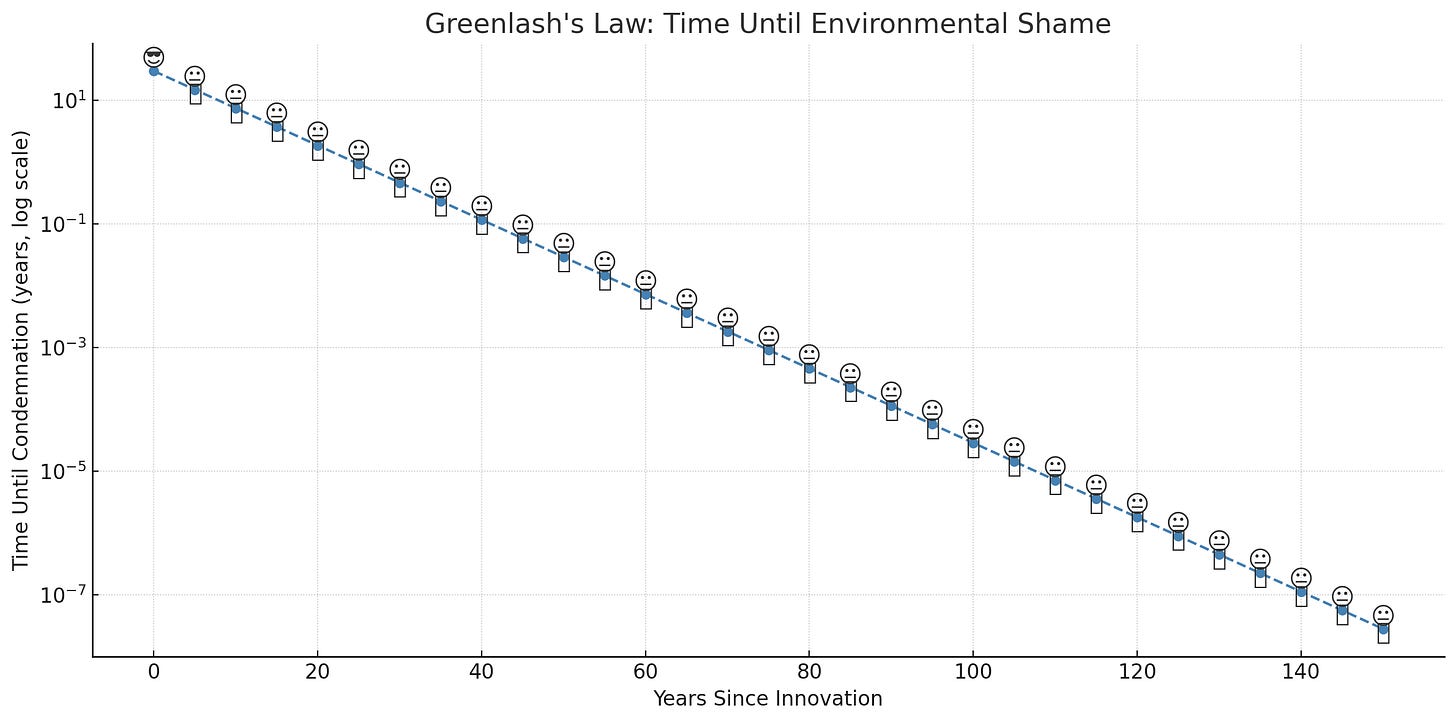Ramblings and recommendations
̶A̶ ̶s̶m̶o̶r̶g̶a̶s̶b̶o̶r̶d̶ ̶o̶f̶ ̶t̶h̶o̶u̶g̶h̶t̶s̶ ̶a̶n̶d̶ ̶r̶e̶c̶o̶m̶m̶e̶n̶d̶e̶d̶ ̶r̶e̶a̶d̶i̶n̶g̶s̶ Some things I feel like saying and several articles I've enjoyed by other people
You may not know about Greenlash's Law, but it knows about you.
“The time between adoption of a new life-improving innovation and popular belief that you shouldn't use it halves every five years.”
Up top is the visual representation.
Key:
😎 User begins enjoying their innovative new thing
🙄 People tell them not to
It means that in the year 2174, the window of opportunity to to enjoy a new life-improving innovation will shrink to 1 second, before people start moaning about it.
Oh for the simpler, innocent days of Moore's Law.
Did you notice how ChatGPT suddenly became the new flying?
There's now a type of person who won't hesitate to tell you that ChatGPT is bad for the planet.
Stories began appearing about LLMs using energy and water and whoosh - straight into the popular psyche.
If you find LLMs useful the message is that you should forego this life improvement to preserve your standing as an OK person.
There seems to be no escape from this flattening of everything into a good/bad binary; to have all your personal choices subject to public moral calibration.
It seems best not to respond. Let it wash over you.
I can see - abstractly - that Epictetus was right about being troubled by our reactions to things, rather than things themselves, but Epictetus being right is hard to internalise as a modus vivendi.
Life is like this, permanently exposed to normative narcissism.
Normative narcissism is that thing where your strong feelings about something trigger a compulsive need to correct and influence the behaviour of others. You want others to think what you think because what you think is best.
As a normative narcissist you assume that your values are universal, which means dissent must be due to ignorance, malice, or moral failure.
Normative narcissism is a means to cultivate self-esteem from being seen and acknowledged as right, just, enlightened and insightful. Your moral posturing reflects a superior identity back to yourself and to others. Criticism of others is a way to affirm your own moral worth.
Among my character flaws, it's the one I dislike most. I'd rather practice what I preach, which is why I consciously cultivate tolerance for ambiguity and increasingly prefer dialectical wandering over reasoning as a way of exploring conflicting visions.
But, enough of my saintly qualities. I've failed, anyway, in this case. Instead, I've been fantasising about telling people to get their tanks the fuck off my lawn when I mention ChatGPT until they have proved that Andy Masley is wrong about chatbot energy use.
Whatever. I'll still use ChatGPT, like I use my car when it suits me, so it doesn't really matter. But I will still feel better about it if Andy is right. I’m rooting for Andy being right. Go Andy.
I made up the concept of normative narcissism, so don't go around quoting it as a thing. It's a neologism designed to capture what I perceive as a bloated self-regard in people who refuse to mind their own business.
Speaking of bloated self-regard in the normative narcissist class, the legal scholar David McGrogan's dissects an emerging utopian legal academic project to promote new ‘norm internalisation throughout society’ so that national borders can be rendered obsolete.
[The button above takes you to Buy Me A Coffee, where you can either offer one-off tokens of support or subscribe long-term for 40% less than through Substack]
Back to ChatGPT (I use the term generically, like 'hoover').
It’s a bit like The Economy. It's one of those things about which we feel we must have an opinion, regardless of any grounding in the subject.
I'm as guilty as anyone. It's embarrassing to look back at this from when I began using it as a search engine to get summaries of things.
Today ChatGPT is woven through my life in a way like nothing since email and browsing the web filtered through to us ordinary people. About the only thing I don't use it for is writing, because I'm too narcissistic to outsource my actual voice. But for ideas, advice, technical queries, dull tasks and timesaving it has become indispensable.
Its failings are rarely an issue for me. They mostly fall into the categories of slightly annoying/frustrating or entertaining.
It fails a lot, but when you use ChatGPT as much as I do, the utility significantly outweighs its weaknesses.
Moaning about ChatGPT being responsible for AI slop and how it gets so many things wrong is a new genre of midwit discourse I can do without.
Yesterday I had it extracting text from a scanned image that would take hours to do unaided.
It was a list of combat casualties for this project.
It was producing some typos and I knew I'd have to visually check each entry before releasing any of the information publicly, but the legwork was being done.
Then names began appearing which were not on the list. ChatGPT was inventing men, complete with their service numbers, and even listing fictitious places where they had been wounded or killed. It kept apologising and promising to be more careful, when I pointed it out, before continuing to invent soldiers until I gave up.





